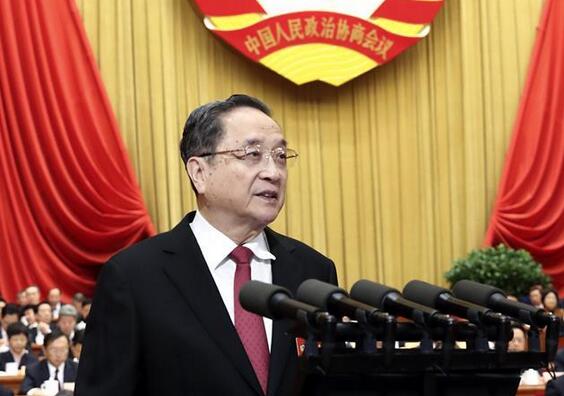China’s top political advisor stresses unity with Xi’s leadership
China raised the curtain on its annual political season on Friday, with top political advisor Yu Zhengsheng pledging conformity to the Communist Party of China (CPC) Central Committee with Xi Jinping as the core.
As chairman of the Chinese People’s Political Consultative Conference (CPPCC) National Committee, Yu delivered a work report to more than 2,000 political advisors gathered in the heart of Beijing to discuss the political, economic and social issues facing the world’s most populous nation and second-largest economy.
Yu said that in the course of the nation’s great rejuvenation, the importance of 2016 was assured by the endorsement of Xi Jinping as the core of the CPC Central Committee.
Xi’s core status embodies the fundamental interests of the Party and the people, and will be of far-reaching significance. His political ideas should be a guidance for all, Yu told the political advisors.
During the gathering, attendees are expected to fully align their thinking with Xi’s strategic blueprint of the “four comprehensives” — comprehensively achieve a moderately prosperous society, deepen reform, advance rule of law and govern the CPC strictly, which is crucial to the drive of China becoming a well-off society by 2020.
The CPPCC is an important vehicle for multiparty cooperation and political consultation under the leadership of the CPC, and the key to socialist democracy.
Political advisors come from various walks of life and ethnic groups. They serve as a think-tank for the government, legislative and judicial organs, and put forward proposals on major political and social issues.
Their proposals can be considered a rough barometer of public opinion, signaling issues of concern on anything from industrial policy to domestic violence, and telegraph the general national agenda for the next year and beyond.
In the past year, seminars have convened to discuss a plethora of topics including new development ideas, supply-side structural reform, revitalization of the northeast region, and rural poverty relief. Agendas also included creation and management of national nature reserves, preservation of land resources and prevention of pollution, Yu said.
Yu commended the advisors for their work on the 13th Five-Year Plan (2016-2020), saying 2017 is a more important year for the plan’s implementation.
The CPPCC will help the country better adapt to the “new economic normal” of steady and healthy economic development, he said.
Friday’s CPPCC session was the start of the most important two weeks on China’s political calendar. The National People’s Congress (NPC), China’s top legislature, is set to begin its annual session on Sunday.
Together dubbed the “Two Sessions,” the meetings are where political and economic developments are reviewed and discussed and key policies are made. This year, attendees will also discuss the general provisions of civil law.
In his speech, Yu saw room for improvement in some aspects of CPPCC work.
“Discussion of state affairs needs to go deeper and to be more practical, work on democratic oversight needs to be further standardized, and CPPCC National Committee members need to do better in the performance of their duties,” Yu noted.
The advisors’ main efforts this year should be directed toward stable and healthy economic development, communication with representatives of public opinion in Taiwan, and maintaining social harmony and stability.
Yu said communication between political advisors and the youth in Taiwan should be strengthened to consolidate public support for the peaceful development of cross-Strait relations.
Political advisors will continue to oversee the implementation of CPC Central Committee policies and raise practical proposals.
While praising the Standing Committee of CPPCC National Committee for promoting unity and friendship, Yu called for work on solidarity and friendship with the people in Hong Kong, Macao and Taiwan, as well as overseas Chinese.
